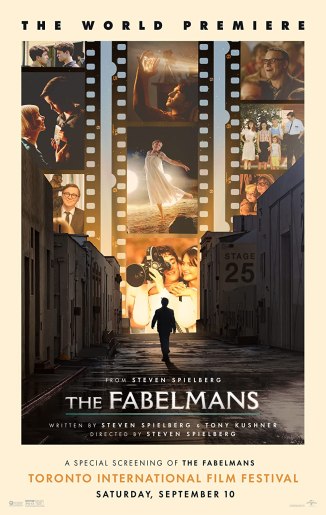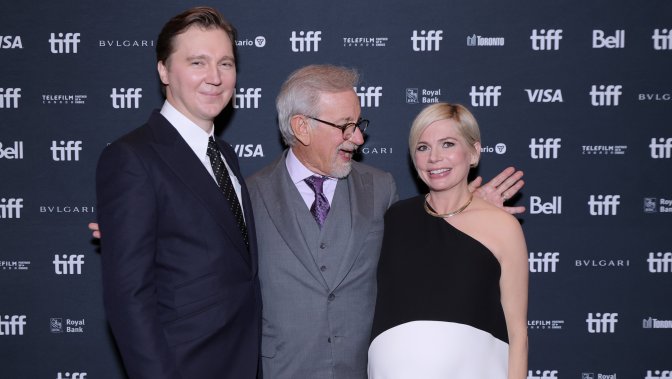[Follow along with all of the coverage of the 2022 Toronto International Film Festival here.]
Steven Spielberg has spent nearly half a century extolling the power of movies.
His filmography represents a masterclass of modern cinema. He’s touched nearly every genre, expanding what we thought was possible for that type of film. He invented the contemporary blockbuster, with several of his movies ranking among the highest-grossing of all time. His visual language has inspired a sense of wonder in moviegoers for generations. The breadth of his subject matter represents a creative mind constantly seeking challenges and knowledge. One of the most compelling threads throughout his career is how film can survey and celebrate the integrity of the human spirit. That thread helped make Steven Spielberg a household name, almost synonymous with the word “movie.” In a way, he is its human manifestation.

The Fabelmans finds Spielberg exploring what it means to be a human manifestation of movies. Co-written by Tony Kushner, the film is the semi-autobiographical story of Sammy Fabelman (Mateo Zoryon Francis-DeFord and Gabriel LaBelle), a young man who dreams of being a filmmaker. His passion for film sparks when his parents, Mitzi (Michelle Williams) and Burt (Paul Dano), take him to see The Greatest Show on Earth. Sensing his fascination with the film’s train crash scene, Mitzi hands young Sammy a camera to recreate the moment himself.
From then on, Sammy is laser-focused on becoming a skilled filmmaker. He works within his family’s modest means, finding innovation from innocuous everyday actions. Sammy discovers in real-time the power of his camera. The visceral reactions from the audience transfix him as much as big-screen projections. He also finds that his camera reveals what he may not want to see, like his parents’ disintegrating marriage and Mitzi’s growing closeness to Burt’s best friend Bennie (Seth Rogen). What’s a budding teenage filmmaking savant supposed to do with that insight while balancing school, girls, bullies, and religion?
It’s a lot for Sammy to handle, which also means it’s a lot for Spielberg to share. Clichéd and obvious as it is to say, The Fabelmans is genuinely his most personal film. You can feel his passion and love for his fictionalized memories in every frame and every directorial choice. All of his classic touches – the sweeping camera shots, the so-called “Spielberg face” – are here. This time, he uses them not to inspire awe or another highly-charged emotion but to invite you into his psyche. He wants to be understood. He wants us to know why filmmaking matters to him, and what it gave and took from him. I can’t recall another time where Spielberg was so nakedly, bravely vulnerable in his storytelling (perhaps Schindler’s List).
Given Spielberg’s vulnerability, it’s remarkable how The Fabelmans dodges self-indulgence. Even at its most contemplative or hyper-specific, the film is always engaging and relatable. It balances its tricky subject matter – adultery, mental illness, anti-Semitism – with heart, pathos, and even levity to break the tension. (Mitzi interrupting Sammy and Burt’s fight by declaring she’s started therapy is an absurd delight.) Spielberg makes it easy to plug into the film through several touchpoints: a yearning for a fulfilled creative life, financial stability amidst a changing world, the never-ending quest for emotional truth, and the curdling fear that what you love can harm who you love. They all weave beautifully together into a deeply-felt experience.

Spielberg puts his family’s story in the hands of an excellent ensemble. In what will surely be a star-making role, Gabriel LaBelle carries Sammy’s suffocating emotional weight well, while still conveying teenage Spielberg’s drive and ambition. Michelle Williams delivers her best-ever performance as the Fabelman matriarch Mitzi. (I’d argue it’s the best Spielberg performance since Daniel Day-Lewis in Lincoln.) She wobbles between emotional oblivion and sparkling vitality without missing a beat, constantly captivating and luminescent. Even as the somewhat discouraging and distant Burt, Paul Dano’s sympathetic warmth further complicates how we regard the Fabelman household. Seth Rogen does the same with his subtly antagonistic role as Uncle Benny, while Judd Hirsch makes a hilarious and unforgettable impression as the Fabelmans’ long-lost uncle.
The Fabelmans is the clearest expression of Spielberg’s ethos that film shows us who we are and what we need. With this seat behind the camera, his filmmaking feels particularly reflective and urgent. Maybe Spielberg is considering the twilight of his career. Perhaps he sees the shifting winds of film away from art to content and crafted a response.
Whatever the provocation, The Fabelmans is an incredibly vital work in the Spielberg canon. Yes, it’s autobiography bordering on therapy. It also offers our best look into who Spielberg is, what he needs, and why he is arguably the greatest filmmaker of the modern era.

2 thoughts on “TIFF 2022: ‘The Fabelmans’ is a Stunning, Intimate Look into Steven Spielberg’s Psyche”